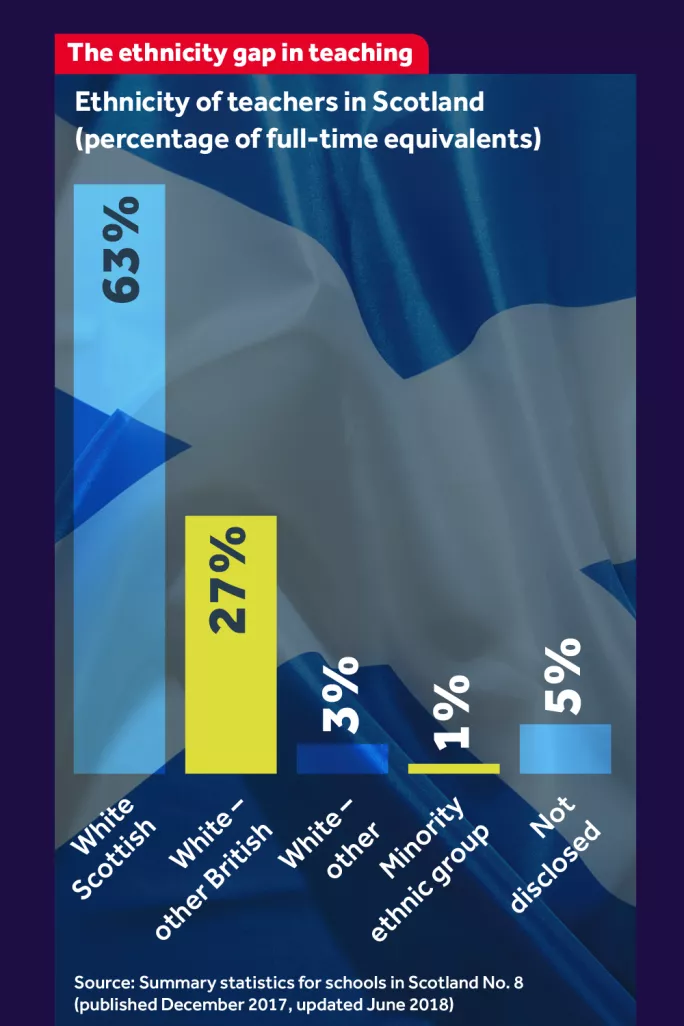Entry course to reveal the ‘reality’ of life as a teacher

A new Entry to Teaching for Graduates one-year course will start on Tuesday with what is believed to be a unique selling point - which may help make teaching a more diverse profession in Scotland.
As well as offering Higher English and N5 maths, two essentials for teaching, the course will provide an immersion in what teaching is all about: a 36-week primer on policy, jargon, educational philosophies and teaching strategies that students are likely to be quizzed on when interviewed for a university initial teacher education (ITE) place.
The aim of the Glasgow Clyde College course is to solve an age-old problem, in Scotland and beyond: you have to apply minimum entry standards to get into teaching, but in doing so you risk barring the way for highly capable people who don’t tick the right boxes. You may have an investment banker who doesn’t have the qualifications to become a maths teacher (see box, below), or an inspirational artist or business owner whose long-forgotten struggles at school now stand in the way of that dream teaching job.
There is, of course, no shortage of places that can help with that - further education colleges that promise to get students through N5 maths and Higher English, both prerequisites for becoming a teacher in Scotland.
Teaching uncovered
The standard entry course model, however, also involves a third subject. In practice, this is often the poor relation of the three, neglected and sometimes even dropped by students who know it will not be essential to their application for teaching.
But Glasgow Clyde College’s new course, with 20 places that are all likely to be filled, aims to make that third element far more useful to a would-be teacher, and in doing so help to attract a more ethnically and socially diverse range of people into teaching.
Anne McMullen, a senior lecturer in the college’s school of general education and social science, says: “When I was interviewing for that programme the year before last, it became apparent that a lot of these students were asking for Higher English, Nat 5 maths - and ‘anything else’.
“They were doing a third subject just because they had to - something that wasn’t particularly valuable to them - and quite often when they got an offer from a PGDE course, they would drop the third subject.”
Rather than offering that third subject - which might be history, physics, psychology or sociology - McMullen decided it would be far better “to design a course that actually gave these people something useful”. The course will include units designed for teaching assistants, and college staff are also designing some of their own units, to create a broad mix of practical knowledge about teaching.
When interviewed by universities, says McMullen, candidates who have been through college maths and English courses “tend not to know the educational landscape, so that’s what we’re hoping to cover”. She also hopes to dash misconceptions about teaching - such as the idea that primaries are idyllic settings - and counter ignorance about realities such as the many pupils with additional support needs that teachers will encounter.
James McEnaney, a Glasgow Clyde lecturer and former secondary English teacher who has helped to put the new course together, believes problems with teacher recruitment are best addressed by improving the current system of teacher education rather than seeking radical alternatives.
He says: “Other countries try to find clever ways to bypass teacher training - we could instead just find ways to get more people into teacher training.” McEnaney also hopes that college-based approaches such as the Glasgow Clyde course could provide a springboard into teaching for students who have previous FE experience and feel supported in that setting.

“It would be great if it helped more working-class people - who might, for example, have obtained their degree through the FE route - to enter teaching, which would be a good thing for the profession,” he says.
The course includes work experience and fits all lessons into three days, with none scheduled on Mondays or Fridays, to make it easier for students who have families, or jobs they wish to continue over the year. “We’re getting quite a lot of what I’d call non-traditional applicants,” says McMullen, referring to graduates of degrees seldom seen on such college courses, including art and broadcast media.
“They certainly bring an interesting angle to the profession,” she says. “I’ve been pleased with the diversity of the candidates, too - both in terms of ethnicity and gender.” One noticeable trend, McMullen adds, is the number of young Asian men who have applied for primary teaching, a group under-represented in the sector. McMullen believes that Scotland has plenty of room for improvement in opening up teaching to a broader mix of people. “We need clearer routes into teaching, we need more of them and they need to be targeted - but it really is important to maintain our standards,” she says.
Ken Muir, chief executive of the General Teaching Council for Scotland (GTCS), says: “It is essential that those in Scottish education continue to develop new and innovative training programmes that support individuals to gain entry to the teaching profession. This is to ensure that we continue to sufficiently prepare students for the demands of teaching today, that we continue to grow the teaching workforce in Scotland, and that we attract an increasingly diverse range of applicants to the profession.” He adds that the GTCS is exploring a “wide range of ways” to boost teacher recruitment and retention, which includes “exploring the potential for courses offered in the college sector to contribute to widening access to the teaching profession”.
A Scottish government spokesman welcomed the new course, saying: “Allowing individuals to gain the qualifications necessary to join teacher-education programmes in this way is welcome, given it offers the potential to help increase the pool of well-qualified candidates entering the profession.”
You need a Tes subscription to read this article
Subscribe now to read this article and get other subscriber-only content:
- Unlimited access to all Tes magazine content
- Exclusive subscriber-only stories
- Award-winning email newsletters
Already a subscriber? Log in
You need a subscription to read this article
Subscribe now to read this article and get other subscriber-only content, including:
- Unlimited access to all Tes magazine content
- Exclusive subscriber-only stories
- Award-winning email newsletters